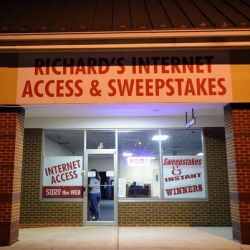Two people were arrested for running an illegal gambling operation out of an Internet cafe in Juno Beach, Florida. The two arrested were the owner and co-manager of the Cafe 777, located on Donald Ross Road.
Cafe 777 advertised itself as an “all-in-one” computer store. Patrons could copy, print, and send faxes from the Internet cafe. Edmund John Salata, the owner of Cafe 777, compared his store to Kinko’s, or at least that was how he wanted his operation portrayed to the public.
Pretended to Be a Kinko’s Type Store
According to local law enforcement, customers also could gamble on the desktop computers located in the chain of stores owned by Edmund John Salata. When investigators took a closer look at the storefront, though, they realize that the computers were set up as terminals for illegal gambling.
One of the tip-offs was the postings which advertised cash payouts to the customers. Gaming cafes skirt the law when they do not offer cash prizes, but money payouts makes such operations illegal in most states. Certainly, having cash payouts posted on the walls of a Kinko’s-type store is suspicious.
Cafe 777’s Gambling Connotations
The name “Cafe 777” would have been a hint that a gambling operation existed on the site, if someone was familiar with slot machine gambling or online casinos. “777” is a common winning combination in 3-reel classic slot machines. For that reason, “777” has been used by more than one online casino for branding purposes. Thus, any slots player or online gambler likely would have spotted the “Cafe 777” sign and wondered whether it involve gambling on some level.
Arrested Edmund Salata and Joel Matthews
When police conducted a raid on the Cafe 777 operation, they arrested the 57-year old Mr. Salata along with Joel Lynn Matthews, a 44-year old co-manager of one of the stores. They two were charged with promoting a lottery, illegal possession of a slot machine, and unlawfully keeping a gambling house. Ms. Matthews was listed as the “co-manager” alongside Salata, according to court records.
Salata and Matthews both are residents in the Abacoa section of Jupiter. Besides that, Edmund Salata has a home in Pinellas County, in the beachfront city named Treasure Island. Both defendants were released after their arrest on their own recognizance. After the two were arrested, the property owner who gave the lease to Salata for Cafe 777 filed an eviction notice.
In Operation Since 2013
According to authorities, they have been investigating Cafe 777 since 2013. Local police raided the business once before in April 2015, providing ample warning that the alleged criminals should shut down their operation. At the time of the 2015 raid, authorities hauled away 0 computers.
This time, police investigators decided to take a more systematic approach to the illegal gambling operation. They examined a bank account shared by Salata and Matthews. The account showed nearly $300,000 in deposits over a 13-month period from March 2014 to April 2015. Each of the deposits was for less than $10,000, a sign they were trying to evade laws that require banks to report such deposits to federal regulators.
Internet Cafes in Florida
Internet cafes have been a controversial subject in Florida for a number of years. Such operations are similar to the sweepstakes cafes which were prevalent in Florida several years back. At one time, the sweepstakes cafe owners lobbies the Florida legislature for legal status.
At other times, Internet cafe owners have taken their cases to the Florida court system, hoping for legal status. The various judicial and legislative attempts to legalize Internet cafes eventually failed. Florida has specific laws which limit legal gambling to the Seminole Tribe’s casino monopoly, along with state-sanctioned lottery gambling and the racetrack betting operations (which allows some slot machines).
In light of the $3 billion in payments the Seminoles are paying to the state over a 7-year period, Florida law enforcement takes a dim view of businesses which would make a profit outside the normal regulated gaming industry. Illegal Internet cafes almost never pay taxes on their revenues, because such revenues would reveal the existence of a profitable and illegal gambling operation.
The same arguments have played out across the United States. Some states, including Illinios and West Virginia, allow slots-style gaming machines in Mom-n-Pop stores. States like Texas allow 8-Liners or maquinetas in cities which approve such gaming. No states allow sweepstakes cafes, though they are popular illegal gaming operations throughout all 50 states. Kentucky, California, and Arizona have instituted crackdowns on them in the past few years.

